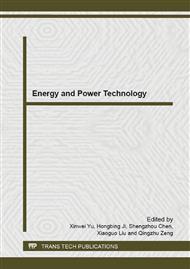[1]
Jones, Donald W., and Paul N. Leiby(1996). The macroeconomic impacts of oil price shocks: A review of literature and issues., Columbus : Oak Ridge National Laboratory.
Google Scholar
[2]
Hamilton, James D(1983). Oil and the macroeconomy since World War II., The Journal of Political Economy, Vol. 91(2), pp.228-248.
DOI: 10.1086/261140
Google Scholar
[3]
KiseokLee, Shawn Ni (2002). On the dynamic effects of oil price shocks: a study using industry level data,. Journal of Monetary Economics, Vol. 49 (4), p.823–852.
DOI: 10.1016/s0304-3932(02)00114-9
Google Scholar
[4]
Olivier J. Blanchard, Jordi Gali(2007). The Macroeconomic Effects of Oil Shocks: Why are the 2000s So Different from the 1970s? . , Cambridge : NBER Working Paper No. 13368.
DOI: 10.3386/w13368
Google Scholar
[5]
Hooker, Mark A. (2002). Are Oil Shocks Inflationary? Asymmetric and Nonlinear Specifications versus Changes in Regime., Journal of Money, Credit and Banking, Vol. 34(2), pp.540-561.
DOI: 10.1353/mcb.2002.0041
Google Scholar
[6]
Y., Zhao, J,. Huang(2004). Fluctuation of international oil price's effects on China's economy and studies on countermeasure,. Price theory and practice, Vol. 2004(12), pp.32-33. (In Chinese).
Google Scholar
[7]
W., Sun (2007). Energy impact's influences on China's macro economy., economic theory and management, Vol. 2007(2), pp.31-36. (In Chinese).
Google Scholar
[8]
Goodhart, C., Hofmann B, (2001). Asset Prices, Financial Conditions, and the Transmission of Monetary Policy. , The conference on Asset Prices, Exchange Rates and Monetary Policy, Stanford University.
DOI: 10.7551/mitpress/7412.003.0006
Google Scholar
[9]
Gali J, Gertler M, (1999). "The Science of Monetary Policy: A New Keynesian Perspective. Journal of Economic Literature, Vol. 37 (2), pp.1661-1707.
DOI: 10.1257/jel.37.4.1661
Google Scholar


